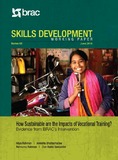| dc.description.abstract | In Bangladesh, the school dropout rates at both the primary and secondary level are quite high. Majority of the school dropout children end up unemployed or in low-quality jobs. Hence, training programs can be a potential solution to address the rising unemployment among school dropout youths. In this context, BRAC piloted a program titled Skills Training for Advancing Resources (STAR) in the five divisions of Dhaka, Chattogram, Sylhet, Rajshahi, and Khulna in 2012, in partnership with the Bureau of Non-formal Education (BNFE). During this pilot phase, the program provided livelihood skills training to a pool of 1000 urban adolescents aged 14-18 years, who completed five years of schooling under the Basic Education for Hard to Reach Urban Working Children (BEHTRUWC) project of the Bureau of Non-Formal Education (BNFE). This study uses three rounds of quantitative data (collected in 2012, 2013 and 2015) to estimate the short and long-run impacts of the pilot phase of the STAR program by employing different techniques such as Difference-in-Difference (DiD) with fixed effect, Propensity Score Matching (PSM) and DiD using PSM and also includes qualitative methods to supplement the quantitative findings. Specifically, this study estimates the impacts on employment, income, savings, early marriage, etc. of adolescents, and on household welfare. Findings show that the positive impacts on the adolescents’ labour market participation and monthly income are sustainable and higher in the long-run. In particular, the participants significantly shifted to the skilled labour market in the long-run. The impact on employment has been found to be higher for female participants. The program also significantly reduces early marriage (for females). Additionally, positive impacts are found in empowerment, self-confidence and the workplace environment. The study recommends keeping the profile of trades consistent with market demands as well as participants’ age and their individual interests and ensuring post-training follow up by program staff, among others, to make this program even more effective. | en_US |

